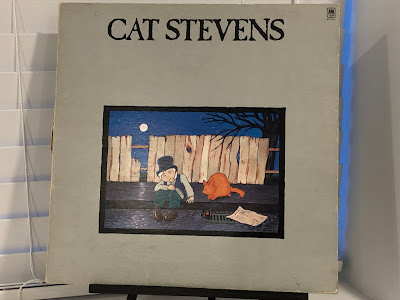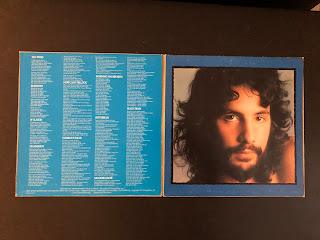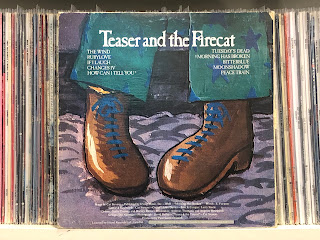I've spun the album a few times now, and my dollar was really well spent, and the vinyl was remarkably clean, although most of the clicks and pops seemed to have all waited until the runout on "Peace Train" to make themselves known. Still not as bad as it could have been, and still better than I had hoped.
Having the benefit of hindsight and more that a little bit of history to look back on, this was a really cool period of time. By 1971 Cat Stevens had released five albums, Teaser and the Firecat being his fifth. A year earlier "Wide World" was a pretty big deal, and creatively and commercially Cat Stevens was a pretty big deal. From what I've read Teaser and the Firecat would represent the zenith of his career. It was the album where it all came together. I'm not saying that after this he was over and done. You can't really correlate commercial success and artistic expression, but when you're a casual fan who likes his hits and appreciates the deeper cuts seeking out the album where he was seemingly at his peak isn't necessarily a band idea.
Back to the time that was 1971, the '60s were over. The hippie movement would meander along for a few more years, and the echoes of the folk era were being incorporated into music in ways that would have been hard to imagine in the mid '60s. In short, Teaser and the Firecat was alchemy where the idealism of the '60s and the emerging spiritualism of the '70s were combined to create magic, or in this case triple platinum.What I really liked was being able to explore the songs on the first side, first. The songs I'd not heard and being able to sit and listen and read the lyrics was really cool. It's kind of fun to read old reviews of the album where the lyrics are referred to as being simplistic and the ideas hold no surprises. I'd never really thought about it like that. Each artist brings what they bring to the table, whether the ideas are simple or complicated is matter of taste. One not necessarily being better than the other ... just different.
Side two of course is where things really opened up for me. Having really enjoyed the deeper cuts, three out of the five cuts on the second side are now considered classics, and with that familiarity also comes the power of nostalgia. It's a potent combination that can frankly make things better than they actually are.
One of the big surprises to me was "Morning Has Broken" a song that I really haven't listened to much since that early burst of play on the radio when I was a kid. It was still a wonderful memory, but I didn't have much desire to hear it again. It was played out. Wjen it came on the first thing that jumped out at me was how forward in the mix the opening piano work was, and even between the verses when the piano was featured ... it was awesome. The piano was an uncredited contribution by none other than Rick Wakeman. Of course "Moonshadow" is as playful and enchanting as ever, but it was "Peace Train" that I really spent some time actually listening to and really enjoyed. Yes, I still single out the big songs - but that's because of decades of familiarity. This isn't to say I didn't thoroughly the lesser known songs, especially the first side of the record.
Yeah, this was very much a '70s record, with all of the idealism of youth. After all, Mister Stevens was still a very young man and already a seasoned musical veteran by 1971.



Comments
Post a Comment